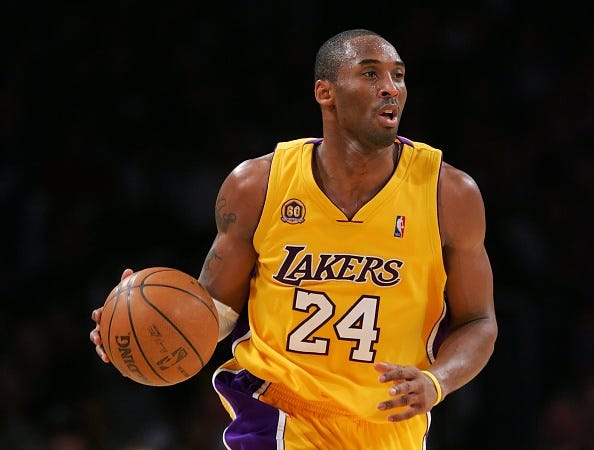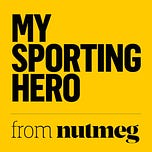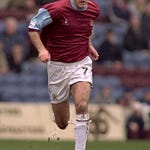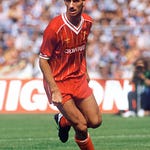In My Sporting Hero, a new podcast series from Nutmeg, footballers talk about the athletes who inspire them. Sometimes those sportsmen and women are also footballers. Sometimes not. You can listen to the audio on this post, on the podcast app of your choice (just search for ‘My Sporting Hero’) or enjoy the written version below.
Our next guest is Ian Cathro.
Ian’s varied coaching career has covered Scotland (where he managed Hearts), England, Portugal and Spain. The progressive Dundonian is fascinated with the psychology of winning and is rated highly, not least by Nuno Espírito Santo, whom he has assisted at various clubs. Ian is currently manager of Portuguese outfit Estoril.
Ian’s sporting hero is Kobe Bryant, the late American basketball legend who spent 20 years with the Los Angeles Lakers, winning five NBA Championships.
I’ve chosen Kobe Bryant as my sporting hero because of a number of reasons, not least the drive that this man possessed to be better in every aspect of his life every day. I find so many aspects of his story incredibly inspirational. You search for some parallels and connections to someone else’s story. And there are some in there, believe it or not. It all comes back to the mental strength and the determination that he had to be the best possible human being that he could be.
The first time I really looked into Kobe’s story was prior to his death. I’m not a huge basketball fan but I’m a coach and there are elements of movements and plays in basketball that I found really interesting. I spent some time looking at different coaches, and there is a man called Tex Winter who is responsible for the triangle offence. I found that very interesting, thinking about different movements and how players would learn these movements, because in basketball things happen so quickly and the spaces are smaller. Then I researched Phil Jackson. These two guys worked together for years across two different teams, and reading about them shone a light on the personality of Kobe Bryant. The more I found out about Kobe, the more I realised: this is not a normal person.
It’s rare for me to see someone and think, I need to see more of this person. To ask, why is this guy this way? One of the stories he told was about when he was 13-years-old. His basketball association would make a ranking of the up-and-coming young players. He wasn’t physically mature at that point, so he was lower on the list. And he said that he looked at everybody above him, and they became who he had to hunt down. His perspective was: you can be better than me now, but you won’t be better than me when it matters. He describes how in all the different leagues and summer camps and at different competitions, when he would encounter these other kids, he would play to his weaknesses rather than to his strengths. So even at that stage, he was focusing on the skills he felt he had to develop that were going to take him above all the others, whereas the others were just playing to their strengths so that they could perform at the best level possible at that point. They already had that high ranking, but he looked beyond that with total focus. It’s incredible to think about someone at 13-years-old thinking things through in that way with that level of determination and intelligence.
He told another story, I believe it was in his rookie season and it was about a key moment in a championship series game. He had taken three shots which he described as air balls; they were all short. This was one of the most embarrassing experiences imaginable. There’s something really tough when you know you’ve properly landed on your arse, you’re covered in shit, and everybody saw. I myself have endured experiences that some people might describe as similar to that.
He just said to himself, okay, so why did that happen? I’m fine, I don’t need anybody’s help, I don’t need a hug, I don’t need support. I just need some space and I need to ask, why did that happen? And then he worked out why it happened. And then he just got to work on improving on what he felt the issue was. He moved past that without anyone shaking up the inside of his head.
In situations like that, the easiest thing is to just not face the problem, especially because everyone saw it. It’s really hard for the person involved to face up to that in an honest way, which allows them to deal with it and move forward.
I think there’s a skill in working with people at the highest levels. It boils down to relationships between human beings and understanding how the team succeeds. There are certain things that a coach is entirely responsible for, such as structure, process, order, discipline and gameplan. How the coach reaches his conclusions and how he makes his decisions must be in conjunction with getting the absolute most out of each player who is in front of him. Particularly when you have someone who has either a higher level of quality or a unique strength, or when someone is simply at a level where he needs to know that he can make his own team decisions in the game. And that comes down to the relationship that exists between a coach and that player. They must be able to find the balance in that relationship and each person must respect the other’s value towards the goal of success, and then you get a point where a team can really peak.

Kobe Bryant was the first guard to play 20 seasons in NBA history. Considering the physical component of that sport and understanding the stress that goes through the human body in a given season, there is no way that a player can do that and not have played matches he really shouldn’t have played in. So there are a fair percentage of games and of parts of seasons when this guy has absolutely played injured. I remember listening to him saying that he felt that he had a responsibility to the people who were coming to watch him. He carried this thing around in his mind that there’s a little boy coming, and his dad or his family has been saving up money for God knows how long to bring him to the match to see Kobe Bryant. He would actually accept that responsibility and think, I’m not letting that little boy down. And that’s just not normal, to have that level of motivation. This is one of the reasons why I admire the guy so much; it goes beyond his own individual achievement. It goes beyond the achievement of the team and it passes into things like being a father, passing a torch down, inspiring what comes next, but all in the context of him just trying to do his job, which is to take charge and win the game for his team. To be able to manage all of that and to get to a point where he thinks, my knee’s a bit bad today, but what about that one kid whose dad’s worked overtime for the past month to buy this ticket? Am I going to take the day off because my knee’s a bit sore? I can rest when I stop. This kid needs to see me because maybe he’s going to be inspired by this and I can’t let him down. For someone to be able to process shit like that and understand things that way and be willing to go through additional pain barriers because those things matter to you, I think it’s incredible.
One of the other interviews I remember was when he was asked about the moment when he ruptured his Achilles and he stayed on the court to hit the free throws and then also managed to walk off. Anybody who has any understanding of what happens to the human body when you have a ruptured Achilles recognises it’s an insane level of pain to withstand to even stay standing up. When he was asked about that, his face remained still and he then proposed a different question to the interviewer: imagine a scenario where you’ve ripped your hamstring, you’re not moving, you’re not walking, and you’re lying on the sofa at night and you’re eating some biscuits. And then the house goes on fire and your kid’s upstairs asleep and your wife’s in bed reading a book. You’re probably going to get off the sofa and you’re going to go get them. You’re going to make sure that they’re okay. In that scenario, I bet there’s a moment when you’ve got no idea if you’ve got a sore leg or not. If you think about that scenario that he’s just painted, other than death, it’s one of the most intense, scary, adrenaline-fueled, awful moments imaginable. And he’s able to apply that same scenario to his day-to-day job to get the best out of himself.
I think those things are ingrained as a kid. There are certain things that you’ll only do when they become normal, and they only become normal because you’ve done them so many times that it just becomes ingrained. So I’m sure it was strange for him to think, it’s only me in the gym at 4am. The rest of society thinks you’re the odd one out, but that’s because people who do extraordinary things live an extraordinary version of normal. He had an ability to be constantly learning from his environment and from his experiences; he had a ferocious curiosity to get the absolute maximum out of himself. When someone makes a commitment to a career in sport, you have to love what you do, you have to feel what the six-year-old felt, what the seven-year-old felt. You have to still be in touch with that part of yourself. Otherwise, there are many, many things that happen in the sports industry that would turn you off very quickly. And I think that’s apparent throughout his career and his life; look at when he finished his career all the different projects that he had, which I also think were incredible. As soon as these guys sign a contract, they’re instant millionaires. So for the guys who are motivated to get to that point, just to get paid, after that they’ve got nothing to call upon. Whereas the guy who maintains that childlike love for the sport, and respect for the sport, and has this determination to get every single thing that you can get out of yourself, they’re very different people and very different players.
That took me right back to when I started out as a kids coach, the way I would try to create different challenges and provoke development in a slightly different way
After the end of his career, he stated he wanted to be the best storyteller around. One of the books that his production company put together was The Wizenard, a kids’ book. I just thought it was really interesting so I had to read it to get inside his mind. So I got the book and he’s basically telling this story about a magical land with a school basketball team with this wizard-like coach who manipulates their environment and creates all sorts of different challenges. For example, one day they wake up, they go to school, they arrive at the court, and every time they try to pick the ball up with their favoured hand, or every time they try to shoot with their favoured hand, the ball just falls, and they look down, and their hand’s not there. But if they try to take the ball or make the pass or take the shot with their weaker hand, the hand is there. That took me right back to when I started out as a kids coach, the way I would try to create different challenges and provoke development in a slightly different way. When I consider all of the things that he could have done with his time, yet he chose to produce a book with so many sporting development and life lessons in it, I just admire the guy.
He’s no longer here and there’s a huge sadness around that. I’m sure as a player, this guy will never be forgotten. And I hope all the other things that he did don’t get forgotten either. I would have liked to have known him, I would have liked to have spent time with him. I would have loved to have asked him questions, I would have loved to listen to him talk. But with respect to working with him, I would much rather have been a teammate, because I think if you’ve got somebody next to you who has that capacity, you’re 10 per cent better just because you’re wearing the same colours.












Share this post